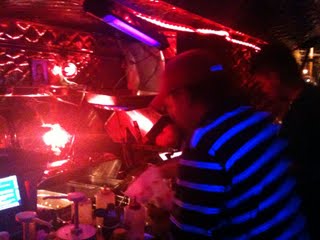
Monday, August 31, 2009
Fascinating piece on Art and Commerce in the Philadlephia Inquirer today, focusing on the Philadelphia Live Arts Festival and Philly Fringe.
You can read the article here. It's mainly a rundown of what's at the Live Arts Festival this year, especially as many of the pieces concern money, economics, wealth and want in different aspects—there's a mention for our new monologue:
In fact, one of monologist Mike Daisey's two shows, copresented with the Philadelphia Theatre Company, is The Last Cargo Cult - about people who do not use money. They live on the eastern side of the remote South Pacific island of Tanna, and Daisey lived with them. His story examines both their beliefs and the international financial crisis.
"It's about how we live in a world that's built on abstraction," says Daisey, "and the underpinnings of our own faith-based economy, built like any religion on absolute faith and trust. It's easy to forget that money is an invention, and we have to believe in it every day for it to have meaning."
What's really interesting is the end of the story:
Ironically, the festival this year has its own little money conundrum: In a copresentation with the Joyce Theater, a major Manhattan home for dance, Live Arts/Fringe has accepted money from the Boeing Co. to present 12 local choreographers, who will be winnowed to a single winner by audience vote over a four-night competition called The A.W.A.R.D. Show! In return, the festival keeps the income from tickets to the performances.
From perusing the web, it appears this competition began in 2006 with the Joyce, and now has spread to other cities. Why is it spreading so far and wide...?
Boeing is sponsoring such shows in four cities. "The people at Boeing are sincere about helping the arts," says Stuccio, in the face of some artists' assertions that the show pits them against one another in a cheesy TV-type reality-show format. The winning choreographer gets $10,000, two runners-up win $1,000.
Let's be clear: Boeing doesn't like art. Boeing is a corporation. Boeing likes the tax break it gets supporting any eligible non-profit. And it chose to send its money with strings that prevent it from helping any artist or art EXCEPT ones who have fought other artists in a cage match for the pleasure of audiences...so whether you think this is a good format or not, Boeing is obviously less interested in art and more interested in live reality TV.
Boeing could choose to give money directly to the festival if it actually cared about supporting work. Hell, it could use the same power it has now to earmark the funds to go directly to choreographers. It didn't want to do that. It wants the choreographers to PROVE they deserve the money, because once you win a fight we know who's the best.
"I'll be totally transparent. I'm a little conflicted about it," Stuccio says. "Should I say to Boeing, no, I'm not going to give money out that way to this community, you keep it? No, I can't do that.
I feel for Nick—it's hard to do the right thing. I wouldn't envy him this situation.
The part that's hard to swallow is that Boeing will be plastered all over the event, Boeing gets the tax breaks for funding it, and Boeing gets perceived by audiences as giving two shits about art. Meanwhile the artists do their work, as they always must, though now it will be perceived through the lens of a competition—they can be publicly judged and assessed for their self-worth and fight one another for lumps of money which wouldn't buy a toilet seat on one of Boeing's planes.
And this is a success story of corporations and the arts working together, because this is America.
You can read the article here. It's mainly a rundown of what's at the Live Arts Festival this year, especially as many of the pieces concern money, economics, wealth and want in different aspects—there's a mention for our new monologue:
In fact, one of monologist Mike Daisey's two shows, copresented with the Philadelphia Theatre Company, is The Last Cargo Cult - about people who do not use money. They live on the eastern side of the remote South Pacific island of Tanna, and Daisey lived with them. His story examines both their beliefs and the international financial crisis.
"It's about how we live in a world that's built on abstraction," says Daisey, "and the underpinnings of our own faith-based economy, built like any religion on absolute faith and trust. It's easy to forget that money is an invention, and we have to believe in it every day for it to have meaning."
What's really interesting is the end of the story:
Ironically, the festival this year has its own little money conundrum: In a copresentation with the Joyce Theater, a major Manhattan home for dance, Live Arts/Fringe has accepted money from the Boeing Co. to present 12 local choreographers, who will be winnowed to a single winner by audience vote over a four-night competition called The A.W.A.R.D. Show! In return, the festival keeps the income from tickets to the performances.
From perusing the web, it appears this competition began in 2006 with the Joyce, and now has spread to other cities. Why is it spreading so far and wide...?
Boeing is sponsoring such shows in four cities. "The people at Boeing are sincere about helping the arts," says Stuccio, in the face of some artists' assertions that the show pits them against one another in a cheesy TV-type reality-show format. The winning choreographer gets $10,000, two runners-up win $1,000.
Let's be clear: Boeing doesn't like art. Boeing is a corporation. Boeing likes the tax break it gets supporting any eligible non-profit. And it chose to send its money with strings that prevent it from helping any artist or art EXCEPT ones who have fought other artists in a cage match for the pleasure of audiences...so whether you think this is a good format or not, Boeing is obviously less interested in art and more interested in live reality TV.
Boeing could choose to give money directly to the festival if it actually cared about supporting work. Hell, it could use the same power it has now to earmark the funds to go directly to choreographers. It didn't want to do that. It wants the choreographers to PROVE they deserve the money, because once you win a fight we know who's the best.
"I'll be totally transparent. I'm a little conflicted about it," Stuccio says. "Should I say to Boeing, no, I'm not going to give money out that way to this community, you keep it? No, I can't do that.
I feel for Nick—it's hard to do the right thing. I wouldn't envy him this situation.
The part that's hard to swallow is that Boeing will be plastered all over the event, Boeing gets the tax breaks for funding it, and Boeing gets perceived by audiences as giving two shits about art. Meanwhile the artists do their work, as they always must, though now it will be perceived through the lens of a competition—they can be publicly judged and assessed for their self-worth and fight one another for lumps of money which wouldn't buy a toilet seat on one of Boeing's planes.
And this is a success story of corporations and the arts working together, because this is America.
Sunday, August 30, 2009
Saturday, August 29, 2009
I Am The Anonymous Model
I Am The Anonymous Model:
And then there were the models. I knew, when I walked into my new agency, Elite Paris, in September of 2007, that I had found my tribe. They were the sweetest, dirtiest talking, weirdest, comic-book-loving, Internet nerding, most breathtakingly cynical, tallest, hard-drinkingest, Proust-readingest, silliest, one-day-I'm-going-to-fuck-all-this-and-be-a-lawyerest, funniest, toughest crowd I'd ever run with. They were all 16 and 20 and 23, and most were amenable to staying up late and talking about Lech Walesa and the problems of teaching post-WWII history in a country where 15 years ago neighbors turned each other in to the secret police for having an extra chicken. Or they would trash talk creepy clients while drinking white wine out of 7UP bottles in the street because none of us had the money for a bar tab and the apartment was too hot. That was good, too.
New York was the place I kept returning to, at first excitedly, then grudgingly, then with relief, because at least I speak the language and the subway runs all night. (And I did try that goat taco place, and it is good.) Although I traveled widely as a child -- I had lived in four countries before I turned 18, and visited numerous cities in Western Europe and Asia, sometimes for work and sometimes for fun -- I didn't see New York until I was 22. And for that I will be forever grateful: this odd conglomeration of mostly working infrastructure and unimpeachable cultural security, this city where you never have to wonder if the movie will open or the band will play or the author will read, is a place I shall never take for granted.
And then there were the models. I knew, when I walked into my new agency, Elite Paris, in September of 2007, that I had found my tribe. They were the sweetest, dirtiest talking, weirdest, comic-book-loving, Internet nerding, most breathtakingly cynical, tallest, hard-drinkingest, Proust-readingest, silliest, one-day-I'm-going-to-fuck-all-this-and-be-a-lawyerest, funniest, toughest crowd I'd ever run with. They were all 16 and 20 and 23, and most were amenable to staying up late and talking about Lech Walesa and the problems of teaching post-WWII history in a country where 15 years ago neighbors turned each other in to the secret police for having an extra chicken. Or they would trash talk creepy clients while drinking white wine out of 7UP bottles in the street because none of us had the money for a bar tab and the apartment was too hot. That was good, too.
New York was the place I kept returning to, at first excitedly, then grudgingly, then with relief, because at least I speak the language and the subway runs all night. (And I did try that goat taco place, and it is good.) Although I traveled widely as a child -- I had lived in four countries before I turned 18, and visited numerous cities in Western Europe and Asia, sometimes for work and sometimes for fun -- I didn't see New York until I was 22. And for that I will be forever grateful: this odd conglomeration of mostly working infrastructure and unimpeachable cultural security, this city where you never have to wonder if the movie will open or the band will play or the author will read, is a place I shall never take for granted.
Snow Leopard Review: Lightened and Enlightened - Snow leopard review - Gizmodo
Snow Leopard Review: Lightened and Enlightened - Snow leopard review - Gizmodo:
On deeper inspection, Snow Leopard's inconspicuous aspects—performance squeezed from underused CPU multicores/GPUs and basic UI tweaks—are found to be the kind of refinement generally reserved for virtuosity. These speed optimizations are deep, reminding me of when a master martial artist puts the entirety of his weight behind a strike (while a neophyte would flails his limbs like a henchman in a Bruce Lee movie). The little UI tweaks are no different than when a great sculptor's chisel works to remove everything non-essential during the final steps on a statue. Challenging 30 years of ever more bloated software tradition, the changes here are about becoming a more effective middleware between the media and the hardware, reducing friction while becoming more useful by, well, being lighter, less visible.
And if you think that's bullshit, well, I can't say you're completely out of your mind, but there's always the consolation that this OS upgrade costs about the same as a used Xbox game.
On deeper inspection, Snow Leopard's inconspicuous aspects—performance squeezed from underused CPU multicores/GPUs and basic UI tweaks—are found to be the kind of refinement generally reserved for virtuosity. These speed optimizations are deep, reminding me of when a master martial artist puts the entirety of his weight behind a strike (while a neophyte would flails his limbs like a henchman in a Bruce Lee movie). The little UI tweaks are no different than when a great sculptor's chisel works to remove everything non-essential during the final steps on a statue. Challenging 30 years of ever more bloated software tradition, the changes here are about becoming a more effective middleware between the media and the hardware, reducing friction while becoming more useful by, well, being lighter, less visible.
And if you think that's bullshit, well, I can't say you're completely out of your mind, but there's always the consolation that this OS upgrade costs about the same as a used Xbox game.
Policeman busted for feeding Pop-Tarts to gorillas - Boing Boing
Policeman busted for feeding Pop-Tarts to gorillas - Boing Boing:
A police office in St. Paul, Minnesota is under investigation for feeding Pop-Tarts to gorillas during an unauthorized after-hours tour of the Como Zoo.
A police office in St. Paul, Minnesota is under investigation for feeding Pop-Tarts to gorillas during an unauthorized after-hours tour of the Como Zoo.
David Byrne Journal: 08.25.09: The Kindle Experience
David Byrne Journal: 08.25.09: The Kindle Experience:
Here’s where the rub is. This machine only reads Kindle files and PDFs. And nothing else out there reads Kindle files. It can read other types of files — Word DOCs, MOBI, TXT etc. — but you have to go through Amazon via email, where they’re converted for a small charge, then sent directly to your Kindle. And, you can’t share a book with your friends, even if they too have a Kindle. No doubt, as with MP3 and iTunes, book publishers would only agree to this system if people couldn’t share their purchases. As we know, Apple has relented on this, and has taken DRM off many of their music files. But which ones? How do you know? Years from now, having gone through a few computers, your music collection is unplayable except for the files without DRM. Well, same with these books — if you migrate to a different tablet (the forthcoming Apple one we hear so much about, for example), you are fucked. All the unread books in your Kindle library are stuck on what will eventually become antiquated technology.
Here’s where the rub is. This machine only reads Kindle files and PDFs. And nothing else out there reads Kindle files. It can read other types of files — Word DOCs, MOBI, TXT etc. — but you have to go through Amazon via email, where they’re converted for a small charge, then sent directly to your Kindle. And, you can’t share a book with your friends, even if they too have a Kindle. No doubt, as with MP3 and iTunes, book publishers would only agree to this system if people couldn’t share their purchases. As we know, Apple has relented on this, and has taken DRM off many of their music files. But which ones? How do you know? Years from now, having gone through a few computers, your music collection is unplayable except for the files without DRM. Well, same with these books — if you migrate to a different tablet (the forthcoming Apple one we hear so much about, for example), you are fucked. All the unread books in your Kindle library are stuck on what will eventually become antiquated technology.
Friday, August 28, 2009
Now Playing: Dead Bird Double Feature | Slog | The Stranger, Seattle's Only Newspaper
Now Playing: Dead Bird Double Feature | Slog | The Stranger, Seattle's Only Newspaper:
The second half of Double Feature, in the flesh, is even tougher. In a small, spare room with 12 fluorescent poles, Smith and drummer Jeffrey Mitchell perform a fearsome duet. He pounds the toms and cymbals, filling the room with a wash of percussive noise, panting loudly in the occasional breaks. Smith rocks and jumps, twisting her bird-claw arms and pivoting violently on the balls of her feet. The drums go silent, and she slowly folds herself into a runner's starting posture, walks around the floor on her knees, and flings herself up and around. The drums begin again.
Panting, Smith hauls a table with an unopened bottle of Maker's Mark and five shot glasses into the center of the stage. She lines up the glasses and pours five shots, drinking the first two quickly. The third goes down with more effort and coughing. She stares at the other two slack-jawed and panting, like an exhausted boxer. Smith holds her hand over her mouth to keep the fourth shot in. The fifth she swallows, then immediately vomits back up through her fingers. She looks pissed. The audience winces and leans forward at the same time.
The second half of Double Feature, in the flesh, is even tougher. In a small, spare room with 12 fluorescent poles, Smith and drummer Jeffrey Mitchell perform a fearsome duet. He pounds the toms and cymbals, filling the room with a wash of percussive noise, panting loudly in the occasional breaks. Smith rocks and jumps, twisting her bird-claw arms and pivoting violently on the balls of her feet. The drums go silent, and she slowly folds herself into a runner's starting posture, walks around the floor on her knees, and flings herself up and around. The drums begin again.
Panting, Smith hauls a table with an unopened bottle of Maker's Mark and five shot glasses into the center of the stage. She lines up the glasses and pours five shots, drinking the first two quickly. The third goes down with more effort and coughing. She stares at the other two slack-jawed and panting, like an exhausted boxer. Smith holds her hand over her mouth to keep the fourth shot in. The fifth she swallows, then immediately vomits back up through her fingers. She looks pissed. The audience winces and leans forward at the same time.
Depression's Evolutionary Roots: Scientific American
Depression's Evolutionary Roots: Scientific American:
But depression is nature’s way of telling you that you’ve got complex social problems that the mind is intent on solving. Therapies should try to encourage depressive rumination rather than try to stop it, and they should focus on trying to help people solve the problems that trigger their bouts of depression. (There are several effective therapies that focus on just this.) It is also essential, in instances where there is resistance to discussing ruminations, that the therapist try to identify and dismantle those barriers.
When one considers all the evidence, depression seems less like a disorder where the brain is operating in a haphazard way, or malfunctioning. Instead, depression seems more like the vertebrate eye—an intricate, highly organized piece of machinery that performs a specific function.
But depression is nature’s way of telling you that you’ve got complex social problems that the mind is intent on solving. Therapies should try to encourage depressive rumination rather than try to stop it, and they should focus on trying to help people solve the problems that trigger their bouts of depression. (There are several effective therapies that focus on just this.) It is also essential, in instances where there is resistance to discussing ruminations, that the therapist try to identify and dismantle those barriers.
When one considers all the evidence, depression seems less like a disorder where the brain is operating in a haphazard way, or malfunctioning. Instead, depression seems more like the vertebrate eye—an intricate, highly organized piece of machinery that performs a specific function.
On the Road - Music - The Stranger, Seattle's Only Newspaper
On the Road - Music - The Stranger, Seattle's Only Newspaper:
A makeup artist I met in Minneapolis said the following rules helped her keep a long-term relationship afloat during the three solid years (!) she spent on a Tina Turner world tour: Make some contact every day without fail, whether by phone, e-mail, or fax, and never go more than three weeks without physical contact. Even if it's just a brief encounter in an airport lounge, find a way to see your bf/gf every 21 days. That way, you're a couple separated by circumstances. Any more than that and you're exes who haven't admitted it yet. This is admittedly both arbitrary and extreme. Plus, not everyone who tours can afford to fly his or her mate out to Winooski, Vermont, for a dirty weekend once a month. However, it does address the fundamental difficulty: remaining engaged. Touring is its own ecosystem, its own time zone. It makes arduous demands on the consciousness even when nothing whatsoever is happening. Abandoning regular life and taking shelter in the hermetic sphere of the van/bus/plane is the blessing and the curse of the experience. You need not have read The Dirt to understand that the road is a hotbed of temptations. But the question of sex with strangers, however complex, is a red herring. The bigger temptation is to check out, rather than fight to straddle two cross-purposeful lives, both of which are entirely real. It's less a question of fighting a war on two fronts than of needing, on some level, to be in two places at once all the time. SEAN NELSON
A makeup artist I met in Minneapolis said the following rules helped her keep a long-term relationship afloat during the three solid years (!) she spent on a Tina Turner world tour: Make some contact every day without fail, whether by phone, e-mail, or fax, and never go more than three weeks without physical contact. Even if it's just a brief encounter in an airport lounge, find a way to see your bf/gf every 21 days. That way, you're a couple separated by circumstances. Any more than that and you're exes who haven't admitted it yet. This is admittedly both arbitrary and extreme. Plus, not everyone who tours can afford to fly his or her mate out to Winooski, Vermont, for a dirty weekend once a month. However, it does address the fundamental difficulty: remaining engaged. Touring is its own ecosystem, its own time zone. It makes arduous demands on the consciousness even when nothing whatsoever is happening. Abandoning regular life and taking shelter in the hermetic sphere of the van/bus/plane is the blessing and the curse of the experience. You need not have read The Dirt to understand that the road is a hotbed of temptations. But the question of sex with strangers, however complex, is a red herring. The bigger temptation is to check out, rather than fight to straddle two cross-purposeful lives, both of which are entirely real. It's less a question of fighting a war on two fronts than of needing, on some level, to be in two places at once all the time. SEAN NELSON
Thursday, August 27, 2009
Suzanne Morrison: The Sausage Maker and his Books
Suzanne Morrison: The Sausage Maker and his Books:
A friend of hers worked for a sausage maker in Philadelphia for a number of years. The sausage maker was an old, grizzled man who loved to read. He was such a voracious reader, in fact, that he made Erin's friend-- we'll call him Tom-- drive the sausage truck to New York for deliveries so that he could sit on the passenger side and read all the way there.
I picture him a bit like my grandpa, actually: Tall, barrel-chested, with thick fingers like, um, sausages. Forgive me, but his hands are important, because while he read his books from Philly to NYC he did the most peculiar thing: he would read a page front and back and then, in one swift movement, he'd tear the page out of the book and throw it out the window.
I have seen some amazing things in my life. Ray Charles. Macchu Picchu. The Louvre. Pompeii. A Monster Truck Rally. But I have never gasped with baffled wonderment like I did at the end of this little anecdote.
When I got home Kurt and I found seats between stacks of books, our dinner plates resting on tables of John McPhee and Stephen King, and I told him the story. He was as baffled and impressed as I was. I said it was a philosophical difference; the sausage maker could accept that he had spent his allotted time with each page and then let it go. I, on the other hand, am too deeply attached to the past. I keep books I've already read and will never read again because they keep the past in my home, nearby, so that I can relive it any time I want. It's a fear of death, I said. The sausage maker is liberated from that fear. Page-ripping is his yoga.
A friend of hers worked for a sausage maker in Philadelphia for a number of years. The sausage maker was an old, grizzled man who loved to read. He was such a voracious reader, in fact, that he made Erin's friend-- we'll call him Tom-- drive the sausage truck to New York for deliveries so that he could sit on the passenger side and read all the way there.
I picture him a bit like my grandpa, actually: Tall, barrel-chested, with thick fingers like, um, sausages. Forgive me, but his hands are important, because while he read his books from Philly to NYC he did the most peculiar thing: he would read a page front and back and then, in one swift movement, he'd tear the page out of the book and throw it out the window.
I have seen some amazing things in my life. Ray Charles. Macchu Picchu. The Louvre. Pompeii. A Monster Truck Rally. But I have never gasped with baffled wonderment like I did at the end of this little anecdote.
When I got home Kurt and I found seats between stacks of books, our dinner plates resting on tables of John McPhee and Stephen King, and I told him the story. He was as baffled and impressed as I was. I said it was a philosophical difference; the sausage maker could accept that he had spent his allotted time with each page and then let it go. I, on the other hand, am too deeply attached to the past. I keep books I've already read and will never read again because they keep the past in my home, nearby, so that I can relive it any time I want. It's a fear of death, I said. The sausage maker is liberated from that fear. Page-ripping is his yoga.
"The shortest road from the fringe to the Rep is through New York." | Slog | The Stranger, Seattle's Only Newspaper
"The shortest road from the fringe to the Rep is through New York." | Slog | The Stranger, Seattle's Only Newspaper:
It's a condition that persists after success. When Mike Daisey was last in town working on his new show The Last Cargo Cult, he urged friends to come see the nascent, workshop version—not least because he wasn't sure they'd ever get a chance to see the finished version. By the time his tour is over, Daisey will have performed from the Kirk Douglas Theater in Los Angeles to the Sydney Opera House. But Seattle, as far as he can tell, will only see Cult's workshop version at the (perfectly respectable, but relatively small) Richard Hugo House.
It's a condition that persists after success. When Mike Daisey was last in town working on his new show The Last Cargo Cult, he urged friends to come see the nascent, workshop version—not least because he wasn't sure they'd ever get a chance to see the finished version. By the time his tour is over, Daisey will have performed from the Kirk Douglas Theater in Los Angeles to the Sydney Opera House. But Seattle, as far as he can tell, will only see Cult's workshop version at the (perfectly respectable, but relatively small) Richard Hugo House.
Collective Arts Think Tank: First Letter to the Field: What's working, what's not working, recommendations
Collective Arts Think Tank: First Letter to the Field: What's working, what's not working, recommendations:
What is written below comes out of two meetings that have included presenters, a critic, artists, service organizations and grant-makers. Individually and sometimes together, we have served on panels and town meetings. We came together this year out of a shared set of concerns about what we see as systemic problems facing the field of contemporary live performance. We plan to keep meeting regularly. We hope our observations and recommendations will be useful to you as you determine the best ways to serve the rapidly changing ecosystem for live art.
This letter is split into three parts: The state of the field; possible actions for artists; and possible actions for grant-makers. We do not expect anyone to be able to absorb or implement all these ideas – we are trying to take stock of the situation on a broad level so that all parties are working with the same information toward shared goals. This letter does not endeavor to be the end of a conversation but rather the beginning of a dynamic and strategic dialogue that speaks to our mutual passion and commitment to a thriving community of artists, audience and advocates.
What is written below comes out of two meetings that have included presenters, a critic, artists, service organizations and grant-makers. Individually and sometimes together, we have served on panels and town meetings. We came together this year out of a shared set of concerns about what we see as systemic problems facing the field of contemporary live performance. We plan to keep meeting regularly. We hope our observations and recommendations will be useful to you as you determine the best ways to serve the rapidly changing ecosystem for live art.
This letter is split into three parts: The state of the field; possible actions for artists; and possible actions for grant-makers. We do not expect anyone to be able to absorb or implement all these ideas – we are trying to take stock of the situation on a broad level so that all parties are working with the same information toward shared goals. This letter does not endeavor to be the end of a conversation but rather the beginning of a dynamic and strategic dialogue that speaks to our mutual passion and commitment to a thriving community of artists, audience and advocates.
Tuesday, August 25, 2009
Beijing loves IKEA -- but not for shopping -- latimes.com
Beijing loves IKEA -- but not for shopping -- latimes.com:
With no plans one Saturday, Zhang Xin told his wife, son and mother to wear something smart and hop into the family sedan. He could have taken them to the Forbidden City or the Great Wall, but he decided on another popular destination -- IKEA.
Riding an escalator past a man lying on a display bed with a book opened on his belly, the clan sauntered into the crush of visitors squeezing onto the showroom path, bumping elbows and nicking ankles with their yellow shopping trolleys.
Zhang said the family needed a respite from the smog and a reliable lunch.
"We just came here for fun," said the 34-year-old office manager. "I suppose we could have gone somewhere else, but it wouldn't have been a complete experience."
With no plans one Saturday, Zhang Xin told his wife, son and mother to wear something smart and hop into the family sedan. He could have taken them to the Forbidden City or the Great Wall, but he decided on another popular destination -- IKEA.
Riding an escalator past a man lying on a display bed with a book opened on his belly, the clan sauntered into the crush of visitors squeezing onto the showroom path, bumping elbows and nicking ankles with their yellow shopping trolleys.
Zhang said the family needed a respite from the smog and a reliable lunch.
"We just came here for fun," said the 34-year-old office manager. "I suppose we could have gone somewhere else, but it wouldn't have been a complete experience."
The Playgoer: New Stephen Schwartz Opera in Santa Barbara
The Playgoer: New Stephen Schwartz Opera in Santa Barbara:
This sounds very much like the reasoning by newspaper publishers, on the heels of gutting classical music, books, dance and theater sections over the past three years. It also lends support to Mike Daisey's sardonic postulation in his one-man show, How The Theater Failed America, that the main purpose of arts institutions (and of newspapers too, it would seem) is self-preservation. Unlike CTG, however, a newspaper harbors no illusions of functioning under some non-profit umbrella. In many arts organizations, that distinction has grown increasingly irrelevant.
This sounds very much like the reasoning by newspaper publishers, on the heels of gutting classical music, books, dance and theater sections over the past three years. It also lends support to Mike Daisey's sardonic postulation in his one-man show, How The Theater Failed America, that the main purpose of arts institutions (and of newspapers too, it would seem) is self-preservation. Unlike CTG, however, a newspaper harbors no illusions of functioning under some non-profit umbrella. In many arts organizations, that distinction has grown increasingly irrelevant.
Monday, August 24, 2009
Sunday, August 23, 2009
A Manifesto for Slow Communication - WSJ.com
A Manifesto for Slow Communication - WSJ.com:
We will die, that much is certain; and everyone we have ever loved and cared about will die, too, sometimes—heartbreakingly—before us. Being someone else, traveling the world, making new friends gives us a temporary reprieve from this knowledge, which is spared most of the animal kingdom. Busyness—or the simulated busyness of email addiction—numbs the pain of this awareness, but it can never totally submerge it. Given that our days are limited, our hours precious, we have to decide what we want to do, what we want to say, what and who we care about, and how we want to allocate our time to these things within the limits that do not and cannot change. In short, we need to slow down.
Our society does not often tell us this. Progress, since the dawn of the Industrial Age, is supposed to be a linear upward progression; graphs with upward slopes are a good sign. Processing speeds are always getting faster; broadband now makes dial-up seem like traveling by horse and buggy. Growth is eternal. But only two things grow indefinitely or have indefinite growth firmly ensconced at the heart of their being: cancer and the corporation. For everything else, especially in nature, the consuming fires eventually come and force a starting over.
We will die, that much is certain; and everyone we have ever loved and cared about will die, too, sometimes—heartbreakingly—before us. Being someone else, traveling the world, making new friends gives us a temporary reprieve from this knowledge, which is spared most of the animal kingdom. Busyness—or the simulated busyness of email addiction—numbs the pain of this awareness, but it can never totally submerge it. Given that our days are limited, our hours precious, we have to decide what we want to do, what we want to say, what and who we care about, and how we want to allocate our time to these things within the limits that do not and cannot change. In short, we need to slow down.
Our society does not often tell us this. Progress, since the dawn of the Industrial Age, is supposed to be a linear upward progression; graphs with upward slopes are a good sign. Processing speeds are always getting faster; broadband now makes dial-up seem like traveling by horse and buggy. Growth is eternal. But only two things grow indefinitely or have indefinite growth firmly ensconced at the heart of their being: cancer and the corporation. For everything else, especially in nature, the consuming fires eventually come and force a starting over.
Saturday, August 22, 2009
Friday, August 21, 2009
Thursday, August 20, 2009
Fringe leftist losers: wrong even when they're right - Glenn Greenwald - Salon.com
Fringe leftist losers: wrong even when they're right - Glenn Greenwald - Salon.com:
But that is how our political culture works. Throughout the Bush years, those who said demonstrably true things were continuously dismissed as fringe, conspiracy-driven leftist-losers: those who questioned whether Saddam really had WMDs; those who argued that the invasion of Iraq would lead to long-term military bases in that country; those who worried that warrantless eavesdropping and Patriot Act powers would lead to abuses; those who opposed the war in Afghanistan on the ground that it would be drag on for years with no resolution, etc. etc.
Having been proven right about all of those things hasn't changed perceptions any at all.
But that is how our political culture works. Throughout the Bush years, those who said demonstrably true things were continuously dismissed as fringe, conspiracy-driven leftist-losers: those who questioned whether Saddam really had WMDs; those who argued that the invasion of Iraq would lead to long-term military bases in that country; those who worried that warrantless eavesdropping and Patriot Act powers would lead to abuses; those who opposed the war in Afghanistan on the ground that it would be drag on for years with no resolution, etc. etc.
Having been proven right about all of those things hasn't changed perceptions any at all.
Tom Ridge on National Security After 9/11 - Washington Whispers (usnews.com)
Tom Ridge on National Security After 9/11 - Washington Whispers (usnews.com):
Tom Ridge, the first head of the 9/11-inspired Department of Homeland Security, wasn't keen on writing a tell-all. But in The Test of Our Times: America Under Siege...and How We Can Be Safe Again, out September 1, Ridge says he wants to shake "public complacency" over security. And to do that, well, he needs to tell all. Especially about the infighting he saw that frustrated his attempts to build a smooth-running department. Among the headlines promoted by publisher Thomas Dunne Books: Ridge was never invited to sit in on National Security Council meetings; was "blindsided" by the FBI in morning Oval Office meetings because the agency withheld critical information from him; found his urgings to block Michael Brown from being named head of the emergency agency blamed for the Hurricane Katrina disaster ignored; and was pushed to raise the security alert on the eve of President Bush's re-election, something he saw as politically motivated and worth resigning over.
Tom Ridge, the first head of the 9/11-inspired Department of Homeland Security, wasn't keen on writing a tell-all. But in The Test of Our Times: America Under Siege...and How We Can Be Safe Again, out September 1, Ridge says he wants to shake "public complacency" over security. And to do that, well, he needs to tell all. Especially about the infighting he saw that frustrated his attempts to build a smooth-running department. Among the headlines promoted by publisher Thomas Dunne Books: Ridge was never invited to sit in on National Security Council meetings; was "blindsided" by the FBI in morning Oval Office meetings because the agency withheld critical information from him; found his urgings to block Michael Brown from being named head of the emergency agency blamed for the Hurricane Katrina disaster ignored; and was pushed to raise the security alert on the eve of President Bush's re-election, something he saw as politically motivated and worth resigning over.
Wednesday, August 19, 2009
Parabasis: The Fringe Is Very Strange
Parabasis: The Fringe Is Very Strange:
Add to that, the deal one signs (if it has not been changed by now) is truly a bad one. You have to put up five hundred bucks (in the beginning it was three, I think) you produce it yourself (pay for rehearsal, props, anything) and you don't get to choose your venue, your performance time or date, and often you get a bare hour or less to tech (according to friends who've been in) ... and on top of that, you give away 2% of the subsidiary rights to your work ... you PAY for them to take a chunk of your works future earnings. That's a bad deal.
Bad deal for the artist. Good deal for the Fringe, they risk ... NOTHING. They stand to gain much.
Add to that, the deal one signs (if it has not been changed by now) is truly a bad one. You have to put up five hundred bucks (in the beginning it was three, I think) you produce it yourself (pay for rehearsal, props, anything) and you don't get to choose your venue, your performance time or date, and often you get a bare hour or less to tech (according to friends who've been in) ... and on top of that, you give away 2% of the subsidiary rights to your work ... you PAY for them to take a chunk of your works future earnings. That's a bad deal.
Bad deal for the artist. Good deal for the Fringe, they risk ... NOTHING. They stand to gain much.
Tuesday, August 18, 2009
The False Positive of the T.A.Z « blog
The False Positive of the T.A.Z « blog:
The reality of such spaces is that they exist by virtue of the economic systems we have in place outside the zone. Not everyone is equal or has equal capacity since we only have what we bring inside the zone which, again, is determined by where we are in the outside world. The very structures that gave rise to the abundance there are reinforced upon reentry to the real world. After all, we need to make even more money this coming year so we can have even better blinky gadgets to give away next fall.
Because the feeling of radical freedom has been met in this space there is little to no need to make that potential a reality. It is uncountable the number of people I have met who spend 360 days out of the year in buttoned down desk jobs only to “let their freak flag fly” during a week of adultery and debauchery that is made permissible by some idea that the rules are different in Black Rock City. While the actions may, from some perspectives, be permissible, the consequences of those actions remain beyond the confines of the event.
The irony of course is that far from freeing themselves from the confines of social structures and rules they are wholly adopting the rules and confines of a different culture. No true questioning has gone on.
The reality of such spaces is that they exist by virtue of the economic systems we have in place outside the zone. Not everyone is equal or has equal capacity since we only have what we bring inside the zone which, again, is determined by where we are in the outside world. The very structures that gave rise to the abundance there are reinforced upon reentry to the real world. After all, we need to make even more money this coming year so we can have even better blinky gadgets to give away next fall.
Because the feeling of radical freedom has been met in this space there is little to no need to make that potential a reality. It is uncountable the number of people I have met who spend 360 days out of the year in buttoned down desk jobs only to “let their freak flag fly” during a week of adultery and debauchery that is made permissible by some idea that the rules are different in Black Rock City. While the actions may, from some perspectives, be permissible, the consequences of those actions remain beyond the confines of the event.
The irony of course is that far from freeing themselves from the confines of social structures and rules they are wholly adopting the rules and confines of a different culture. No true questioning has gone on.
Monday, August 17, 2009
FROM THE MAILBAG:
Hello Mike,
I got on your mailing list as a result of an e-mail I sent you after seeing "How Theatre Failed America" in New York.
When I got your e-mail updates about the Last Cargo Cult I was deeply conflicted and slightly annoyed. Why? Let me explain...
Your e-mail suggests the monologue is at least in part an examination of a culture that worships America. This is interesting from an anthropological or ethnological perspective but the thing that concerns me about such an examination is that unless you provide balance in the form of information or commentary from other cultures that DON'T worship America, or that don't like America, or heck even revile America, then you may be playing into some of the worst assumptions Americans make about themselves. Namely that everyone in the world wants to be an American, or if they don't then they're jealous. As a Canadian I assure you, not everyone wants to be an American, and they're not even slightly jealous.
Anyway without having seen your new stuff I'm not sure what to think. I only hope that you aren't so completely marinated in American cultural narcissism that you realize America isn't special or different than anywhere else. Sure maybe these folks on this little island in the middle of nowhere worship America but don't for a second think that the rest of the world feels that way. No offense intended.
Break a leg with your new stuff.
Frank
MY RESPONSE:
Frank,
I debated responding, as it is usually better to bite one's tongue.
You haven't seen THE LAST CARGO CULT, but are offended by what the monologue might be about. Rereading your email from May of last year you appear to have been touched by my work, but it would seem clear you have very little faith in me to do a compelling job with this particular material.
Fair enough.
I will admit that it rankles a bit that you have seen HTFA, so you are familiar with my work, yet somehow believe I AM SO FUCKING RETARDED that I would have created a monologue with the viewpoints/intentions you express in your email.
Perhaps someday you will see THE LAST CARGO CULT. Perhaps you will not. In any case, you should know that receiving emails from people with feedback about work they haven't seen and have no understanding of is really annoying.
Best regards,
md
PS: I've decided to unsubscribe you from future announcements, as I don't wish to receive your feedback on other future projects you haven't seen yet.
Hello Mike,
I got on your mailing list as a result of an e-mail I sent you after seeing "How Theatre Failed America" in New York.
When I got your e-mail updates about the Last Cargo Cult I was deeply conflicted and slightly annoyed. Why? Let me explain...
Your e-mail suggests the monologue is at least in part an examination of a culture that worships America. This is interesting from an anthropological or ethnological perspective but the thing that concerns me about such an examination is that unless you provide balance in the form of information or commentary from other cultures that DON'T worship America, or that don't like America, or heck even revile America, then you may be playing into some of the worst assumptions Americans make about themselves. Namely that everyone in the world wants to be an American, or if they don't then they're jealous. As a Canadian I assure you, not everyone wants to be an American, and they're not even slightly jealous.
Anyway without having seen your new stuff I'm not sure what to think. I only hope that you aren't so completely marinated in American cultural narcissism that you realize America isn't special or different than anywhere else. Sure maybe these folks on this little island in the middle of nowhere worship America but don't for a second think that the rest of the world feels that way. No offense intended.
Break a leg with your new stuff.
Frank
MY RESPONSE:
Frank,
I debated responding, as it is usually better to bite one's tongue.
You haven't seen THE LAST CARGO CULT, but are offended by what the monologue might be about. Rereading your email from May of last year you appear to have been touched by my work, but it would seem clear you have very little faith in me to do a compelling job with this particular material.
Fair enough.
I will admit that it rankles a bit that you have seen HTFA, so you are familiar with my work, yet somehow believe I AM SO FUCKING RETARDED that I would have created a monologue with the viewpoints/intentions you express in your email.
Perhaps someday you will see THE LAST CARGO CULT. Perhaps you will not. In any case, you should know that receiving emails from people with feedback about work they haven't seen and have no understanding of is really annoying.
Best regards,
md
PS: I've decided to unsubscribe you from future announcements, as I don't wish to receive your feedback on other future projects you haven't seen yet.
Request from my friend Karney of the documentary OVERDRAWN:
Over at Digg.com they've teamed up with the Wall Street Journal to ask Treasury Secretary Geithner some questions this Thursday the 20th. Reproduced below is my question. If we Digg it up enough, it will get asked...
"Given the massive bailouts to the banks, how can you allow the predatory practices with which the banks continue to fleece low-income consumers to continue? I'm speaking mostly about so-called overdraft "protection" (similar to a mafioso's protection in that they're really credit at loan-shark prices) and predatory mortgage loans. The Credit Card Bill of Rights was a big step in the right direction. Isn't it time for debit card holders to be given similar protections against exorbitant interest rates?
Don't we the taxpayers now own sizable chunks of these banks, and shouldn't we therefore be able to tell them to stop abusing we the people?"
Here's the link.
Over at Digg.com they've teamed up with the Wall Street Journal to ask Treasury Secretary Geithner some questions this Thursday the 20th. Reproduced below is my question. If we Digg it up enough, it will get asked...
"Given the massive bailouts to the banks, how can you allow the predatory practices with which the banks continue to fleece low-income consumers to continue? I'm speaking mostly about so-called overdraft "protection" (similar to a mafioso's protection in that they're really credit at loan-shark prices) and predatory mortgage loans. The Credit Card Bill of Rights was a big step in the right direction. Isn't it time for debit card holders to be given similar protections against exorbitant interest rates?
Don't we the taxpayers now own sizable chunks of these banks, and shouldn't we therefore be able to tell them to stop abusing we the people?"
Here's the link.
Intiman Theater’s No-Frills Approach to Replacing Bartlett Sher - NYTimes.com
Intiman Theater’s No-Frills Approach to Replacing Bartlett Sher - NYTimes.com:
Ms. Whoriskey said she would begin spending time here starting this winter. She has yet to decide whether to buy a home in Seattle or live here part-time. This is a sensitive point for some in Seattle, given that Mr. Sher has been away for long stretches in recent years directing in New York and elsewhere.
Ms. Whoriskey said she would begin spending time here starting this winter. She has yet to decide whether to buy a home in Seattle or live here part-time. This is a sensitive point for some in Seattle, given that Mr. Sher has been away for long stretches in recent years directing in New York and elsewhere.
Sunday, August 16, 2009
Saturday, August 15, 2009
The Movie Non-Review: 'GI Joe: The Rise of Cobra'
The Movie Non-Review: 'GI Joe: The Rise of Cobra':
Sometimes, a film defies conventional narrative and artistic standards so utterly that it seems unfair to judge it by them. G.I. Joe is such a case, a movie that has, through its own inverse accomplishment, earned the right to speak for itself. Consider this a tone poem in 40 scraps of dialogue:
You don't ask to be a part of G.I. Joe. You get asked.
If you're going to shoot something, kill it. Otherwise take up knitting.
The Joes will never know what hit them.
General Hawk is stable now, but he won't be conscious for another day or two.
She was a blonde then.
You have to promise me you will not let my genius egghead little brother get hurt.
I didn't want anyone to see me like this.
I have a target in mind, one the French will never forget.
Deploy the sharks!
Sometimes, a film defies conventional narrative and artistic standards so utterly that it seems unfair to judge it by them. G.I. Joe is such a case, a movie that has, through its own inverse accomplishment, earned the right to speak for itself. Consider this a tone poem in 40 scraps of dialogue:
You don't ask to be a part of G.I. Joe. You get asked.
If you're going to shoot something, kill it. Otherwise take up knitting.
The Joes will never know what hit them.
General Hawk is stable now, but he won't be conscious for another day or two.
She was a blonde then.
You have to promise me you will not let my genius egghead little brother get hurt.
I didn't want anyone to see me like this.
I have a target in mind, one the French will never forget.
Deploy the sharks!
Friday, August 14, 2009
Thursday, August 13, 2009
Do You Know How Popular I Am? - Film - The Stranger, Seattle's Only Newspaper
Do You Know How Popular I Am? - Film - The Stranger, Seattle's Only Newspaper:
Earlier youth movies like Rebel Without a Cause, Easy Rider, Saturday Night Fever, even Risky Business, offered a more or less binary system for audience identification. You were a straight or a rebel, a conformist or an original, an us or a them. Hughes's works expanded the language of youthful alienation. His social cosmology was infinitely more elaborate and self-aware. The hyperarticulate, culturally plugged-in kids in his films understood that the identities available to them were merely arbitrary roles, each burnout as predetermined as every jock—all equally subject to ridicule by rich, beautiful jerks who lived to make you feel unpopular, uncool, unloved. The finales were uplifting, but finales weren't the point (sometimes they sold us out, like Allison's makeover and Andie choosing Blane). The twin suns of the Hughes galaxy were shame and dread. Funny, cute, and underdoggy as they were, his characters were gripped by terror that they might fail to choose a viable self.
Earlier youth movies like Rebel Without a Cause, Easy Rider, Saturday Night Fever, even Risky Business, offered a more or less binary system for audience identification. You were a straight or a rebel, a conformist or an original, an us or a them. Hughes's works expanded the language of youthful alienation. His social cosmology was infinitely more elaborate and self-aware. The hyperarticulate, culturally plugged-in kids in his films understood that the identities available to them were merely arbitrary roles, each burnout as predetermined as every jock—all equally subject to ridicule by rich, beautiful jerks who lived to make you feel unpopular, uncool, unloved. The finales were uplifting, but finales weren't the point (sometimes they sold us out, like Allison's makeover and Andie choosing Blane). The twin suns of the Hughes galaxy were shame and dread. Funny, cute, and underdoggy as they were, his characters were gripped by terror that they might fail to choose a viable self.
The Playgoer: The Pee Wee and Annette Shows
The Playgoer: The Pee Wee and Annette Shows:
On the heels of my last post about Center Theatre Group placing its bets on theater companies rather than playwrights for the development of new work, Culture Clash's playwright Richard Montoya wrote me with a very good further distinction, that CTG's commissions of Culture Clash speculate not so much on his troupe, but on the audiences the troupe might attract. It's an interesting point that ties commissions more closely to marketing than I'd thought of.
DING DING DING DING
On the heels of my last post about Center Theatre Group placing its bets on theater companies rather than playwrights for the development of new work, Culture Clash's playwright Richard Montoya wrote me with a very good further distinction, that CTG's commissions of Culture Clash speculate not so much on his troupe, but on the audiences the troupe might attract. It's an interesting point that ties commissions more closely to marketing than I'd thought of.
DING DING DING DING
Wednesday, August 12, 2009
Theater News - Theater - Theater News - The Stranger, Seattle's Only Newspaper
The Last Cargo Cult - The Stranger, Seattle's Only Newspaper:
Mike Daisey's new solo show, The Last Cargo Cult, is all about money and one of the few places in the world where it has limited influence: Tanna, a small island in the South Pacific, 1,100 miles east of Australia. This past February, Daisey flew to Tanna for John Frum Day, a sacred pageant at the base of an active volcano where islanders reenact the history of the United States in song and dance. This year's pageant was nine hours long, including U.S. military drill routines and Barack Obama being chased by a dragon.
Mike Daisey's new solo show, The Last Cargo Cult, is all about money and one of the few places in the world where it has limited influence: Tanna, a small island in the South Pacific, 1,100 miles east of Australia. This past February, Daisey flew to Tanna for John Frum Day, a sacred pageant at the base of an active volcano where islanders reenact the history of the United States in song and dance. This year's pageant was nine hours long, including U.S. military drill routines and Barack Obama being chased by a dragon.
Raw Story » Whistleblower: Insurance firms ‘very much’ behind town hall disruptions
Raw Story » Whistleblower: Insurance firms ‘very much’ behind town hall disruptions:
Health insurance companies deserve “a great deal of the blame” for the sometimes violent disruptions to town hall meetings on health care, says a former health insurance company executive turned whistleblower.
Wendell Potter, a former executive with health insurer Cigna who now works as the senior fellow on health care at the Center for Media and Democracy, told MSNBC’s Rachel Maddow that health insurance companies “are very much behind the town hall disruptions that you see and a lot of the deception that’s going on in terms of disinformation that many Americans, apparently, are believing.”
Health insurance companies deserve “a great deal of the blame” for the sometimes violent disruptions to town hall meetings on health care, says a former health insurance company executive turned whistleblower.
Wendell Potter, a former executive with health insurer Cigna who now works as the senior fellow on health care at the Center for Media and Democracy, told MSNBC’s Rachel Maddow that health insurance companies “are very much behind the town hall disruptions that you see and a lot of the deception that’s going on in terms of disinformation that many Americans, apparently, are believing.”
Tuesday, August 11, 2009
Yes and Yes and More and Yes and Why - Theater - The Stranger, Seattle's Only Newspaper
Yes and Yes and More and Yes and Why - Theater - The Stranger, Seattle's Only Newspaper:
Once they did a show involving a man slicing lemons—dozens and dozens of lemons—during which a second man told a story about a deformed child and a third man hanged himself. Another show starred two actors beating the crap out of each other in a boxing ring in a downtown alley while feathers and goo were rained on them from a high window. Mitchell tells me about a show that required 20 gallons of stage blood to be poured on the floor. "Afterward, someone was like, 'You should put a tarp down for cleanup,'" he said. "And we were like, 'No, we can't put a tarp down because that cheapens it.'"
In other words: Life is a mess. Our shows are a mess. Let it all be a big fucking mess.
Once they did a show involving a man slicing lemons—dozens and dozens of lemons—during which a second man told a story about a deformed child and a third man hanged himself. Another show starred two actors beating the crap out of each other in a boxing ring in a downtown alley while feathers and goo were rained on them from a high window. Mitchell tells me about a show that required 20 gallons of stage blood to be poured on the floor. "Afterward, someone was like, 'You should put a tarp down for cleanup,'" he said. "And we were like, 'No, we can't put a tarp down because that cheapens it.'"
In other words: Life is a mess. Our shows are a mess. Let it all be a big fucking mess.
Monday, August 10, 2009
Greentech Media
Greentech Media:
What's better – flash memory or hard drives?
Intel will tell us.
The chipmaking giant has conducted its own internal tests on how solid state drives, made up of flash memory, can be incorporated into a corporate computing environment. Intel makes flash drives, so there is clearly a vested interest here, but the tests were conducted by its own IT group.
The results? Hard drives fail around 5 percent of the time. Flash drives will fail around 0.5 percent of the time, according to Dave Buchholz, the IT technology evangelist at Intel who oversaw the tests. Batteries can also last longer in flash-based notebook and give notebook owners 15 percent better battery life.
Hard drives also run about 40 degrees hotter.
What's better – flash memory or hard drives?
Intel will tell us.
The chipmaking giant has conducted its own internal tests on how solid state drives, made up of flash memory, can be incorporated into a corporate computing environment. Intel makes flash drives, so there is clearly a vested interest here, but the tests were conducted by its own IT group.
The results? Hard drives fail around 5 percent of the time. Flash drives will fail around 0.5 percent of the time, according to Dave Buchholz, the IT technology evangelist at Intel who oversaw the tests. Batteries can also last longer in flash-based notebook and give notebook owners 15 percent better battery life.
Hard drives also run about 40 degrees hotter.
















































